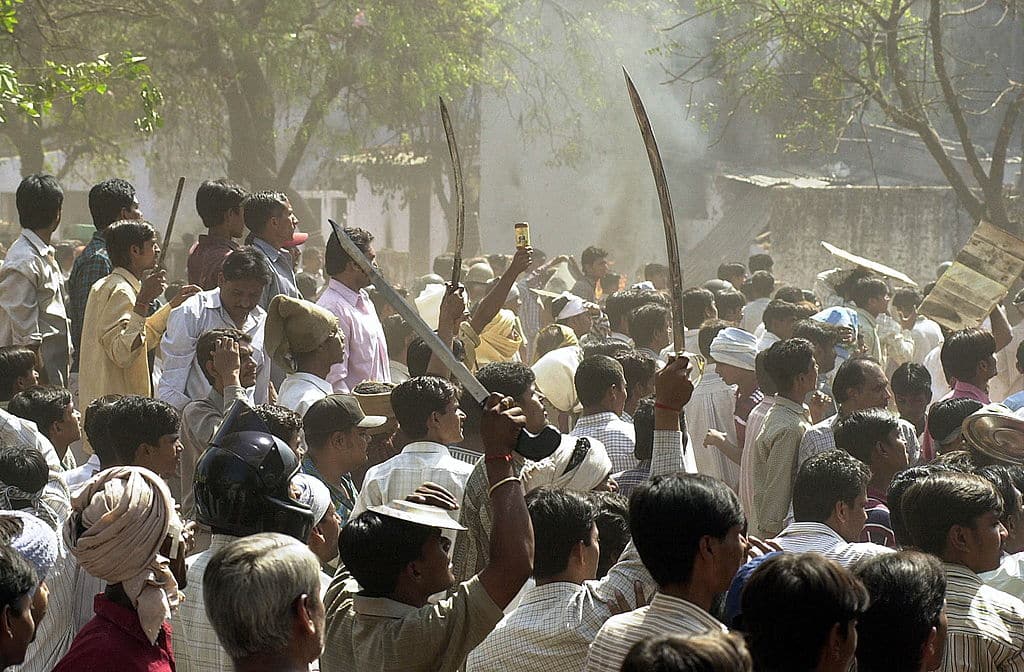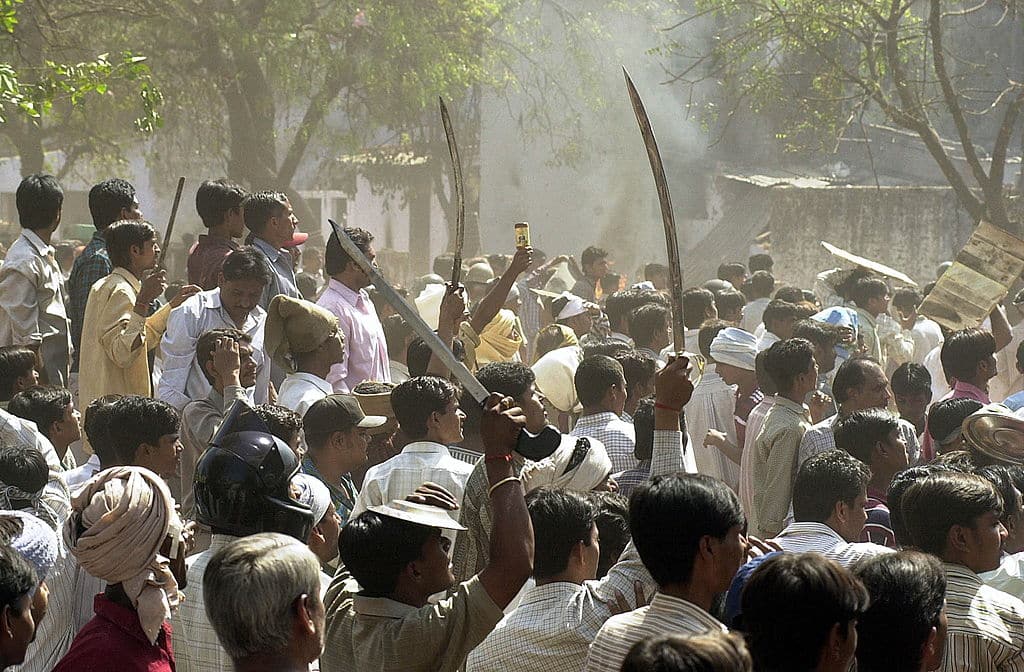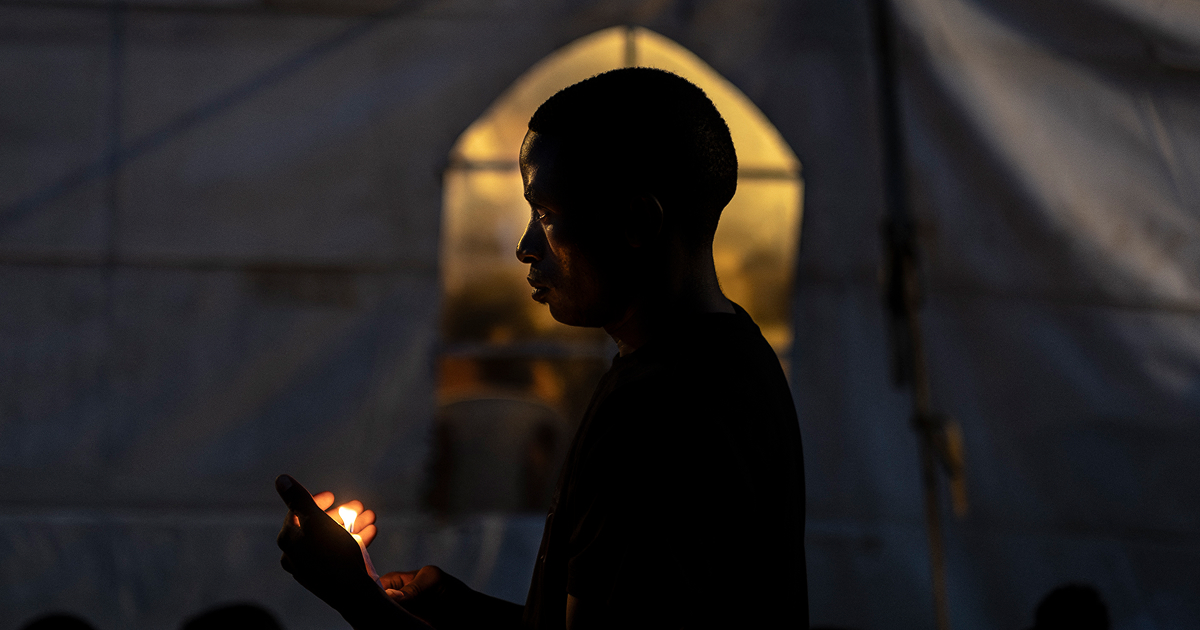Men playing football in a Vancouver suburb on a warm evening in June 2023 thought someone was letting off fireworks when their game was interrupted by sequence of bangs coming from a nearby Sikh temple.
It was when they saw a stationary grey pickup truck, its windows blown out by bullets fired by two hitmen in dark clothes, and the bleeding corpse of Hardeep Singh Nijjar within, that they realised a murder had taken place. Bravely, some gave chase and but the assassins sped away in a waiting car.
The victim was a 45-year-old Sikh separatist leader who was striving to create Khalistan, an independent Sikh homeland in Punjab, from the illusory safety of Canadian soil.
Although he said he had never “believed in, supported or been involved in any violent activity”, India considered him a terrorist, the shadowy head of the Khalistan Tiger Force armed group whom they connected to a 2007 cinema bombing in Punjab that killed six people and injured 40, and to the 2009 assassination of Rulda Singh, a Sikh Indian politician. Indian security forces said he ran terrorist training camps in British Colombia along with “operationalising, networking … and financing” KTF members.
Canadian intelligence services, which had warned Mr Nijjar that he was on a “hit list”, instantly blamed Indian agents for the murder.
“No country, particularly not a democracy that upholds the rule of law, can accept this fundamental violation of its sovereignty,” declared the then Canadian Prime Minister Justin Trudeau when he denounced the murder, but the Indian government denied his allegations and rejected his remarks as “absurd”.
In the months that followed each country recalled ambassadors and expelled the other’s top diplomats in the worst breakdown of relations since 1974. On that occasion, India detonated a nuclear device constructed with the help of plutonium extracted from a Canadian reactor given to the south Asian nation solely for peaceful use, prompting Toronto to cancel support for India’s atomic energy programme.
In the following decade Canada became home to a diaspora of about three quarters of a million Sikhs escaping sectarian violence which in 1984 saw Indian troops storming the Golden Temple of Amritsar, resulting in 400 deaths of separatists sheltering there. Sikh separatists responded by assassinating Indira Gandhi, the prime minister, for ordering the operation.
A year later, 329 died when a bomb exploded on an Air India flight from Toronto to London in an attack blamed on separatists.
It is little wonder that such tensions have resurfaced given the deterioration of harmony between the various religious groups of the sub-continent.
In today’s India 80 per cent of 1.4 billion population is Hindu, 14 per cent Muslim, 2.3 per cent Christian, 1.7 per cent Sikh, with the remainder unspecified. All religious minorities are clashing with ascendant Hindu nationalism in one way or another.
While the murder of Mr Nijjar shone a spotlight on the grievances of the Sikhs, it distracted the world from those of the Muslims, who pose the greatest security threat to Hindu India.
The Islamist terror groups Harakat ul-Mujahidin, Harakat ul-Jihad-i-Islami, Hizbul Mujahideen, Indian Mujahedeen, Islamic State of Iraq and ash-Sham-India, Jaish-e-Mohammed, Lashkar-e Tayyiba, Al Qaeda in the Indian Subcontinent, and the Islamic Revolutionary Guard Corps/ Qods Force area all active in India.
There are no comparable Christian militant organisations though Indian Christians have much cause for discontent amid the emergence of aggressive Hindu nationalism both as a cultural and political force.
Such nationalism has manifested itself most notably in the rise and success of the Bharatiya Janata Party (BJP) of Prime Minister Narendra Modi which since 2014 has been the ruling political party in India.
Shaped by Hindutva, a Hindu nationalist ideology, the party today remains India's largest and most powerful political group in Parliament and state legislatures. For religious minorities, however, its electoral achievements have corresponded with a dark period of intolerance, with Christians among the worst affected.
In Persecuted and Forgotten: A Report on Christians Oppressed for their Faith, which was published in November by the Catholic charity Aid to the Church in Need, India was listed among the countries where persecution worsened significantly in 2023-2024 compared to the previous two years.
The report deplored a “major increase in attacks on Christians and new legislation restricting non-Hindu activity”, saying by the end of 2023 a total of 720 attacks or other instances of persecution were reported in 23 of 28 states, with 287 incidents in the northern state of Uttar Pradesh alone. In 2022, by comparison, there were 599 attacks overall.
Anti-conversion laws in 12 states were also used to accuse priests and female religious of converting children and to search schools and orphanages. A total of 855 people have been detained under such laws between 2020 and 2023.
Amid the clashes between the Meitei and Kuki ethnic groups of Manipur, which have large numbers of Hindus and Christians respectively, some 11,000 Christian homes and 360 churches have been destroyed, often following encouragement by BJP politicians.
Reports of persecution in 2024 revealed multiplying attacks, spurring more than 300 mostly American Christian leaders – including three archbishops, 18 bishops and 167 clergy – to urge the U.S. State Department to designate India as a “Country of Particular Concern” under the 1998 International Religious Freedom Act.
In their letter, they complained of “rapidly escalating state-sanctioned violations of human rights directed at religious minorities” under the Hindu nationalist government. Before the BJP there were “significant but sporadic incidents of persecution”, they said, but now the “situation has radically changed for the worse”.
The signatories noted that India is ranked 11th in the 2024 World Watch List of Open Doors International that reveals the places where persecution of Christians is most extreme.
Open Doors, a global advocacy organisation for persecuted Christians, had explained in a 2023 report that “the rights of all categories of Christian communities are violated in India, since Hindutva radicals … view them all as alien to the nation”.
“They want to cleanse their country of Islam and Christianity and do not shy away from using extensive violence to achieve this.”
“Serious anxiety” about “the increasing atrocities on Christians and other minorities” later in the year prompted Catholic leaders in India to call an ecumenical gathering, in which they denounced rampant discrimination against Christians from the lowest caste Dalits to the higher echelons of society.
They made their plea for toleration at about the same time that police in Uttar Pradesh arrested 10 Christians, including six women and a pastor, during a Sunday prayer service and accused them of trying to convert low-caste Hindus.
According to the Delhi-based United Christian Forum, by October there had been 673 violent attacks against Christians, suggesting that persecution in 2024 could even outstrip that of 2023.
There was certainly no end in sight because in November eight panchayats (local councils) ordered about a hundred Christians in Chhattisgarh to either leave their homes or renounce their faith. Violence erupted and 40 people were forced to take refuge in churches after their property was destroyed, according to Asia News.
The Vatican has so far left interventions to the local Church yet at an event in early December Pope Francis went out of his way to praise one historical Hindu leader for an approach that was radically different from many of those active today. The Pontiff received in audience the participants of a meeting promoted by the Indian foundation Sree Narayana Guru, an association that continues the work of a Hindu leader who died in 1928 after spending much of his life working for inter-religious harmony.
Francis said: “Sree Narayana Guru dedicated his life to promoting social and religious redemption with his clear message that all human beings, regardless of their ethnicity or their religious and cultural traditions, are members of the one human family. He insisted that there should be no discrimination against anyone, in any way and at any level. His message is very appropriate for our world today, where we are witnessing increasing cases of intolerance and hatred between peoples and nations. Unfortunately, manifestations of discrimination and exclusion, tensions and violence based on differences in ethnic or social origin, race, colour, language and religion are a daily experience for many people and communities, especially among the poor, the defenceless and those who have no voice.”
The words of the late pope were no direct criticism of the India of Prime Minister Modhi but they certainly go to the heart of the problems there.
(SEBASTIAN D'SOUZA/AFP via Getty Images)
Men playing football in a Vancouver suburb on a warm evening in June 2023 thought someone was letting off fireworks when their game was interrupted by sequence of bangs coming from a nearby Sikh temple.
It was when they saw a stationary grey pickup truck, its windows blown out by bullets fired by two hitmen in dark clothes, and the bleeding corpse of Hardeep Singh Nijjar within, that they realised a murder had taken place. Bravely, some gave chase and but the assassins sped away in a waiting car.
The victim was a 45-year-old Sikh separatist leader who was striving to create Khalistan, an independent Sikh homeland in Punjab, from the illusory safety of Canadian soil.
Although he said he had never “believed in, supported or been involved in any violent activity”, India considered him a terrorist, the shadowy head of the Khalistan Tiger Force armed group whom they connected to a 2007 cinema bombing in Punjab that killed six people and injured 40, and to the 2009 assassination of Rulda Singh, a Sikh Indian politician. Indian security forces said he ran terrorist training camps in British Colombia along with “operationalising, networking … and financing” KTF members.
Canadian intelligence services, which had warned Mr Nijjar that he was on a “hit list”, instantly blamed Indian agents for the murder.
“No country, particularly not a democracy that upholds the rule of law, can accept this fundamental violation of its sovereignty,” declared the then Canadian Prime Minister Justin Trudeau when he denounced the murder, but the Indian government denied his allegations and rejected his remarks as “absurd”.
In the months that followed each country recalled ambassadors and expelled the other’s top diplomats in the worst breakdown of relations since 1974. On that occasion, India detonated a nuclear device constructed with the help of plutonium extracted from a Canadian reactor given to the south Asian nation solely for peaceful use, prompting Toronto to cancel support for India’s atomic energy programme.
In the following decade Canada became home to a diaspora of about three quarters of a million Sikhs escaping sectarian violence which in 1984 saw Indian troops storming the Golden Temple of Amritsar, resulting in 400 deaths of separatists sheltering there. Sikh separatists responded by assassinating Indira Gandhi, the prime minister, for ordering the operation.
A year later, 329 died when a bomb exploded on an Air India flight from Toronto to London in an attack blamed on separatists.
It is little wonder that such tensions have resurfaced given the deterioration of harmony between the various religious groups of the sub-continent.
In today’s India 80 per cent of 1.4 billion population is Hindu, 14 per cent Muslim, 2.3 per cent Christian, 1.7 per cent Sikh, with the remainder unspecified. All religious minorities are clashing with ascendant Hindu nationalism in one way or another.
While the murder of Mr Nijjar shone a spotlight on the grievances of the Sikhs, it distracted the world from those of the Muslims, who pose the greatest security threat to Hindu India.
The Islamist terror groups Harakat ul-Mujahidin, Harakat ul-Jihad-i-Islami, Hizbul Mujahideen, Indian Mujahedeen, Islamic State of Iraq and ash-Sham-India, Jaish-e-Mohammed, Lashkar-e Tayyiba, Al Qaeda in the Indian Subcontinent, and the Islamic Revolutionary Guard Corps/ Qods Force area all active in India.
There are no comparable Christian militant organisations though Indian Christians have much cause for discontent amid the emergence of aggressive Hindu nationalism both as a cultural and political force.
Such nationalism has manifested itself most notably in the rise and success of the Bharatiya Janata Party (BJP) of Prime Minister Narendra Modi which since 2014 has been the ruling political party in India.
Shaped by Hindutva, a Hindu nationalist ideology, the party today remains India's largest and most powerful political group in Parliament and state legislatures. For religious minorities, however, its electoral achievements have corresponded with a dark period of intolerance, with Christians among the worst affected.
In <em>Persecuted and Forgotten: A Report on Christians Oppressed for their Faith</em>, which was published in November by the Catholic charity Aid to the Church in Need, India was listed among the countries where persecution worsened significantly in 2023-2024 compared to the previous two years.
The report deplored a “major increase in attacks on Christians and new legislation restricting non-Hindu activity”, saying by the end of 2023 a total of 720 attacks or other instances of persecution were reported in 23 of 28 states, with 287 incidents in the northern state of Uttar Pradesh alone. In 2022, by comparison, there were 599 attacks overall.
Anti-conversion laws in 12 states were also used to accuse priests and female religious of converting children and to search schools and orphanages. A total of 855 people have been detained under such laws between 2020 and 2023.
Amid the clashes between the Meitei and Kuki ethnic groups of Manipur, which have large numbers of Hindus and Christians respectively, some 11,000 Christian homes and 360 churches have been destroyed, often following encouragement by BJP politicians.
Reports of persecution in 2024 revealed multiplying attacks, spurring more than 300 mostly American Christian leaders – including three archbishops, 18 bishops and 167 clergy – to urge the U.S. State Department to designate India as a “Country of Particular Concern” under the 1998 International Religious Freedom Act.
In their letter, they complained of “rapidly escalating state-sanctioned violations of human rights directed at religious minorities” under the Hindu nationalist government. Before the BJP there were “significant but sporadic incidents of persecution”, they said, but now the “situation has radically changed for the worse”.
The signatories noted that India is ranked 11<sup>th</sup> in the 2024 World Watch List of Open Doors International that reveals the places where persecution of Christians is most extreme.
Open Doors, a global advocacy organisation for persecuted Christians, had explained in a 2023 report that “the rights of all categories of Christian communities are violated in India, since Hindutva radicals … view them all as alien to the nation”.
“They want to cleanse their country of Islam and Christianity and do not shy away from using extensive violence to achieve this.”
“Serious anxiety” about “the increasing atrocities on Christians and other minorities” later in the year prompted Catholic leaders in India to call an ecumenical gathering, in which they denounced rampant discrimination against Christians from the lowest caste Dalits to the higher echelons of society.
They made their plea for toleration at about the same time that police in Uttar Pradesh arrested 10 Christians, including six women and a pastor, during a Sunday prayer service and accused them of trying to convert low-caste Hindus.
According to the Delhi-based United Christian Forum, by October there had been 673 violent attacks against Christians, suggesting that persecution in 2024 could even outstrip that of 2023.
There was certainly no end in sight because in November eight panchayats (local councils) ordered about a hundred Christians in Chhattisgarh to either leave their homes or renounce their faith. Violence erupted and 40 people were forced to take refuge in churches after their property was destroyed, according to Asia News.
The Vatican has so far left interventions to the local Church yet at an event in early December Pope Francis went out of his way to praise one historical Hindu leader for an approach that was radically different from many of those active today. The Pontiff received in audience the participants of a meeting promoted by the Indian foundation Sree Narayana Guru, an association that continues the work of a Hindu leader who died in 1928 after spending much of his life working for inter-religious harmony.
Francis said: “Sree Narayana Guru dedicated his life to promoting social and religious redemption with his clear message that all human beings, regardless of their ethnicity or their religious and cultural traditions, are members of the one human family. He insisted that there should be no discrimination against anyone, in any way and at any level. His message is very appropriate for our world today, where we are witnessing increasing cases of intolerance and hatred between peoples and nations. Unfortunately, manifestations of discrimination and exclusion, tensions and violence based on differences in ethnic or social origin, race, colour, language and religion are a daily experience for many people and communities, especially among the poor, the defenceless and those who have no voice.”
The words of the late pope were no direct criticism of the India of Prime Minister Modhi but they certainly go to the heart of the problems there.
<em>(SEBASTIAN D'SOUZA/AFP via Getty Images)</em>


















